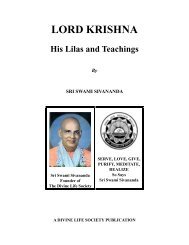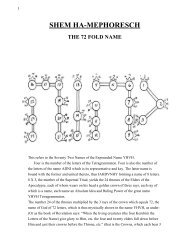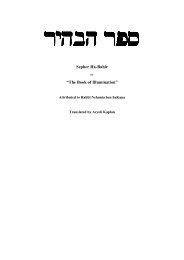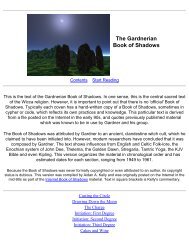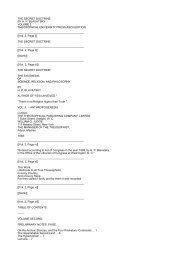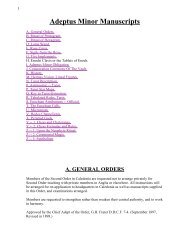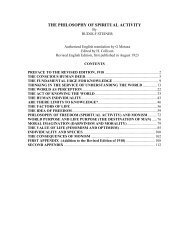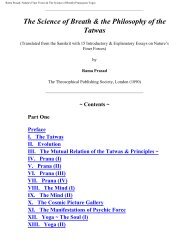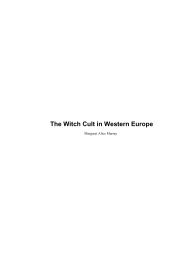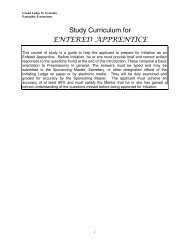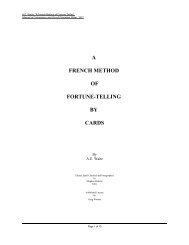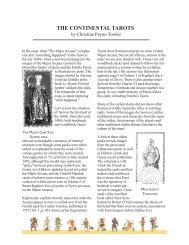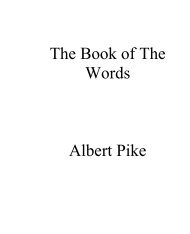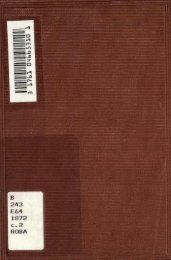You also want an ePaper? Increase the reach of your titles
YUMPU automatically turns print PDFs into web optimized ePapers that Google loves.
The Egyptians' Ideas Of God.<br />
included <strong>the</strong> great cosmic powers and <strong>the</strong> beings who, although held to be supernatural, were yet finite<br />
and mortal, and were endowed by <strong>the</strong> Egyptians with love, hatred, and passions <strong>of</strong> every sort and kind.<br />
The difference between <strong>the</strong> conceptions <strong>of</strong> neter <strong>the</strong> one supreme God and <strong>the</strong> neteru is best shown by an<br />
appeal to Egyptian texts.<br />
In <strong>the</strong> pyramid <strong>of</strong> Unas it is said to <strong>the</strong> deceased,<br />
un-k ar kes neter<br />
Thou existest at <strong>the</strong> side <strong>of</strong> God.[3]<br />
In <strong>the</strong> pyramid <strong>of</strong> Teta it is said <strong>of</strong> <strong>the</strong> deceased,<br />
ut'a-f met neter as set'em-nef metu<br />
He weigheth words, and, behold, God hearkeneth unto <strong>the</strong> words.[3]<br />
nas en Teta neter<br />
God hath called Teta[4] (in his name, etc.).<br />
[1. Die thätige Kraft, welche in periodischer Wiederkehr die Dinge erzeugt und erschafft, ihnen neues Leben verleiht und<br />
die Jugendfrische zurückgiebt." Religion und Mythologie, p. 93.<br />
2. Maspero, Recueil de Travaux, t. iii., p. 202 (l. 209).<br />
3. Ibid., t. v., 27 (ll. 231, 232).<br />
4. Ibid., p. 26 (l. 223).]<br />
{p. lxxxiv}<br />
Views held in <strong>the</strong> first six dynasties.<br />
In <strong>the</strong> pyramid <strong>of</strong> Pepi I. an address to <strong>the</strong> deceased king says,<br />
sesep-nek aru neter aaa-k am xer neteru<br />
Thou hast received <strong>the</strong> form <strong>of</strong> God, thou hast become great <strong>the</strong>rewith before <strong>the</strong> gods.[1]<br />
ta en mut-k Nut un-nek em neter en xeft-k em ren-k en nefer<br />
Hath placed thy mo<strong>the</strong>r Nut <strong>the</strong>e to be as God to thine enemy in thy name <strong>of</strong> God.[2]<br />
tua Pepi pen neter<br />
Adoreth this Pepi God.[3]<br />
Pepi pu ar neter sa neter<br />
Pepi this is <strong>the</strong>n God, <strong>the</strong> son <strong>of</strong> God.[4]<br />
All <strong>the</strong>se extracts are from texts <strong>of</strong> <strong>the</strong> Vth and VIth dynasties. It may be urged that we might as well<br />
translate neter by "a god" or "<strong>the</strong> god," but o<strong>the</strong>r evidence <strong>of</strong> <strong>the</strong> conception <strong>of</strong> neter at that early date is<br />
afforded by <strong>the</strong> following passages from <strong>the</strong> Prisse papyrus,[5] which, although belonging at <strong>the</strong> earliest<br />
http://www.sacred-texts.com/egy/ebod/ebod06.htm (2 <strong>of</strong> 7) [8/10/2001 11:23:29 AM]



